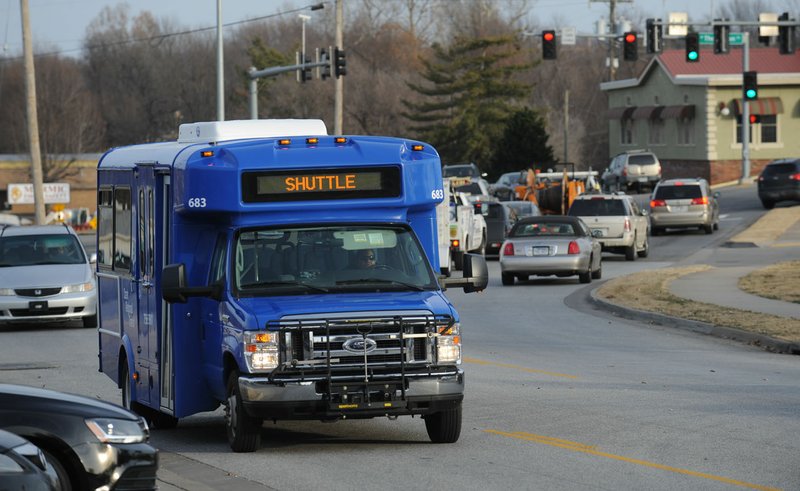SPRINGDALE -- Ozark Regional Transit will continue at full service for a few more weeks in Springdale as the City Council seeks options.
At the request of the transit provider, Springdale budgeted $265,000 to support the service in the city during 2018, an amount equal to that for 2017. Then transit service officials in January asked Springdale and other cities it serves to provide an additional $122,908 as the service faced a budget deficit of $338,000.
Operating costs
Ozark Regional Transit officials on Monday night provided members of the Springdale City Council with operational costs for running a regular route. They include:
• Wages for operators and maintenance personnel
• Employee benefits for those personnel
• Vehicle insurance
• Uniforms
• Shop supplies
• Communication equipment and service costs
• Bus rental and repair
• Fuel and oil
Source: Ozark Regional Transit
The Springdale City Council voted Jan. 9 to pay the transit service half of the annual $265,000 when transit officials asked for a lump sum payment to make up deficits. The council voted Jan. 23 to pay the service an additional $15,000 to keep Springdale's routes running at full service until Feb. 15 as the council gathered alternatives if it did not approve the additional request.
Options could include cutting hours or shortening routes. The service carried nearly 80,000 Springdale riders in 2017 with six hours of service a day for 255 days.
At the Jan. 23 City Council meeting, council members asked Jeff Hatley, the service's public information officer, to return to Monday's committee meeting with options for the council to consider if they chose not to provide the additional $122,908. Joel Gardner, the service's executive director, was speaking to another city council that night.
"The message was lost in translation," Gardner apologized to the council Monday night. He said he and his staff will pull ridership statistics to determine peak rider times and routes, so the council could request cuts in nonpeak times if they decide not to provide additional funding. Gardner said he could have those numbers in 48 to 72 hours.
The council will again consider the increased payment at its Feb. 19 committee meeting.
Mayor Doug Sprouse told Gardner that the service could continue to operate full time in Springdale past that Feb. 15 date using the $132,500 the city already paid as half of its yearly funding.
Additional funding for the transit service could come from several areas in the Public Works Department's budget, said director Sam Goade. "But something will have to give to come up with that money. It's just a matter of analyzing where you want to reduce that money. Everything is well-balanced. Nothing will be put in jeopardy. It's just a matter of can the funds be tweaked to provide funding for ORT."
Funds for the repair of the Razorback Greenway Trail along Spring Creek also must come out of the Public Works budget, Goade and Patsy Christie, director of the city's planning department, pointed out later in the meeting. The trail was damaged during flooding last April.
"I feel like tonight has been a waste of time," said Councilman Jeff Watson, speaking to both Gardner and Goade, whom he expected to have specific budget items prepared for the council.
"All I've heard tonight is, 'We still need money.' There's nothing new tonight. I feel like we've wasted our $15,000."
"When we asked for suggestions that we wanted to look at our options, what did you think we meant," Watson asked Gardner. "How are we supposed to make an informed decision tonight?"
Sprouse pointed out that the timing of Ozark Regional Transit's request was not good. The additional funding would have been easier to consider as the city put together its 2018 budget in August, September and October.
Gardner responded that the transit service board typically knows in October, but Washington County cut its funding of the service by $100,000, which also cut matching funds from the state, in November. And the federal budget for 2018 still has not been approved by Congress, so money to the transit system has been delayed.
"What happens if you don't get the federal money," asked Councilman Jim Reed. "What if we increase it, and you still go belly up?"
Gardner replied the delicate balance working with federal funds has been the same for the past four years.
A fire in January 2017 destroyed most of Ozark Transit's bus fleet, and insurance replaced only the depreciated value of the buses. In addition, ridership is down, advertising income is down and operating and maintenance costs for the transit system are up, Gardner said.
Council member Colby Fulfer also requested that the city and Ozark Transit come up with an operating agreement that would guarantee the city certain service in exchange for the money paid to the transit service. City Attorney Ernest Cate said he would research the idea, but he wasn't sure it could be enforced.
NW News on 02/06/2018

